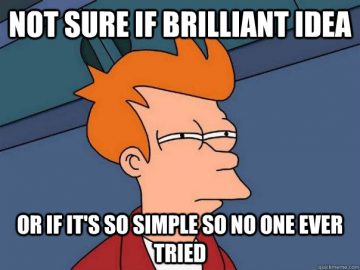Embracing the future of work: How to communicate remotely
What does “the Future of Work” mean to you? To us, it describes how we approach life at Scrapinghub. We don't work in a traditional office (we're 100% distributed) and we allow folks the freedom to make their own schedules (you know when you work best). By finding ways to break away from the traditional 9-to-5 model, we ended up creating a framework for the Future of Work.
Maybe you've heard of this term and want to learn more or maybe you're thinking about implementing aspects of it at your own company, regardless we can't stress enough that effective communication is a key part.
The Future of Work: a Definition
According to Jacob Morgan (who literally wrote the book, The Future of Work), this broad term can be broken into three parts: Freedom/Flexibility, Autonomy, and Choice/Customization. Not mentioned in his list is the rise of AI, although we might as well prepare for our inevitable robot overlords.
The Future of Work both describes how the employment landscape will look in the future as well as how humans will need to adapt to technological leaps and changing expectations of employment. Along these lines, we are remote (always have been, always will be) and we are into machine learning. We’re also open-source to the core and if you think wrangling regular developers is a challenge, wait until you meet scarily intelligent superbrains who know how to maneuver their pet projects into benefiting their company.

We’re living, breathing, and occasionally chaotic proof that the Future of Work is already in the present.
Remote Life Culture
Our two co-founders, Shane from Ireland and Pablo from Uruguay, established a company based on talent, not geography. And that’s not even a marketing line.
Full disclosure, I’m a millennial who was drawn to Scrapinghub because of its remote stance. I wanted the flexibility to be a digital nomad while not needing to rely on the uncertainty of freelance work. This opportunity was the best of both worlds and I’ve since come to understand how parents can also benefit from remote life (and introverts, and folks who like to work at odd hours).
Flexibility
Remote work is not for everyone. While obviously there are co-working spaces and coffee shops, you need to be comfortable with establishing your own schedule along with having the discipline to work by your lonesome.
On the flip side, you have the flexibility and freedom to sort out your responsibilities so that they fit within your life. And this is a pretty important point for companies looking to transition into the remote space. You need to understand how time zones impact the way that teams operate and how to trust your team members to get their work done on time.
Holidays
When hiring team members from a variety of countries and backgrounds, it’s important to keep local holidays in mind. Adopting an open holiday policy both respects the diversity of your company (we’re based in 48 countries) and also recognizes the importance of having time off.
Autonomy
Cultural fit is especially important in a remote team. Autonomy and trust is a huge part of how we operate because there is no one looking over your shoulder (quite literally). Finding motivated people who can finish their work and stay on top of their responsibilities without needing oversight is crucial to running a successful remote operation.
Remote Work
We make sure that our teammates feel comfortable voicing concerns and sharing ideas for improving the company by promoting an open Slack policy. No matter our level of seniority, we remain accessible to all members of Scrapinghub. This policy facilitates collaboration and helps create a sense of community.
Managing Miscommunication
The tone is incredibly difficult to convey through writing. Think of every misunderstanding that you’ve ever had through written communication (text messages, tweets, comments on Facebook, etc.), and then add in work-related stress. This is not a great situation unless you develop straightforward channels of communication.
Our Workflow
This is our system, so feel free to steal the workflow. Honestly, different methods work for different teams. As long as you have one unifying communication stream, go with whatever feels right:
Communication
Slack: Used for day-to-day communication. Slack is mainly how we stay in touch. The Snooze control is great, as is the Tomatobot Pomodoro timer. We're also using Leo the Slack bot as a way for upward feedback and to get a handle on the pulse of our colleagues.
Google Hangouts: This is for team meetings and it can also be used for impromptu watercooler moments. In Growth specifically, we plan our sprints and have eclectic meetings about non-work related topics like aphantasia.
GoToMeeting: We use this platform for our larger gatherings so that the majority of the company can join in. We have Town Halls where our founders share company-wide information in order to increase transparency. GoToMeeting is also used for our Friday lightning talks (affectionately known as Shub talks) where team members present on interesting topics ranging from recipes to machine learning techniques.
Email: Optimal for handling outside communications and for sharing external chats with the rest of our teams.
Intercom: Intercom is how we stay in touch with users and customers.
Sprint Planning and Assigning Tasks
Redmine: Some teams use this as an issue tracker and as a way to assign necessary tasks.
Jira: Used by other teams for support ticket management and sprint planning.
Trello: Used by our Growth team for sprint planning and to keep track of daily activities. I use Trello for my editorial calendar since it’s easy for me to organize categories, assign writers, and set due dates.
Work
GitHub: We’re open source folks and so GitHub is a huge part of how we work. Even vacations are managed through pull requests.
BaseCRM: The sales team uses this for lead management.
Lever.co: Used by the HR team for managing job applications.
Updates and Improvements
Scrapinghub Enhancement Proposals (SHEP): SHEPs (a play on Python Enhancement Proposals) are plans created by employees with suggestions for how Scrapinghub can be improved. SHEPs include everything from HR perks to business planning. SHEPs can be created and submitted by anyone in the company.
Confluence: We recently adopted Confluence as a knowledge base in addition to Google Drive. We want to reduce the silo mentality and Confluence has been especially beneficial in accomplishing this goal. Team updates, meeting notes, and ongoing projects are easily reviewed and shared within the company using this program.
Newsletter: Our weekly newsletter (sent through MailChimp) shares information on more personal topics like vacations, new hires, and birthdays. The newsletters help us to keep up-to-date on the quirky and HR-related aspects of Scrapinghub. We highlight exemplary employees, team bios, and conference activities as a way to keep everyone in the loop and to remain connected.
Wrap Up
We’re on the front lines of exploring the Future of Work. Between our technological advances (and we welcome open source collaborators) and our remote organization, we're experimenting with how to best move forward with maximum flexibility while not turning into robots. We stress effective and clear communication because no one wants to play a game of telephone across international waters. Here are some more tips from other remote companies.

What are your thoughts on the Future of Work and on remote companies? What applications do you use that we don't? What workflows are you implementing that you would like to share? Please let us know in the comments or reach out on Twitter.
